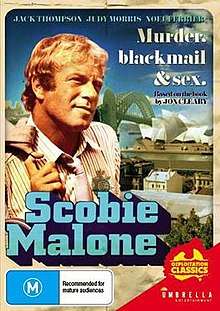Scobie Malone (film)
Scobie Malone (also known as Helga's Web and Murder at the Opera House) is a 1975 Australian erotic mystery film based on the novel Helga's Web by Jon Cleary and starring Jack Thompson and Judy Morris.
| Scobie Malone | |
|---|---|
 DVD cover | |
| Directed by | Terry Ohlsson |
| Produced by | Casey Robinson |
| Written by | Casey Robinson Graham Woodlock |
| Based on | Helga's Web (novel) by Jon Cleary |
| Starring | Jack Thompson Judy Morris |
| Music by | Peter Clarke |
| Cinematography | Keith Lambert |
| Edited by | Bill Stacey |
Production company | Kingcroft Australia Australian Film Development Corporation |
Release date |
|
Running time | 98 minutes |
| Country | Australia |
| Language | English |
| Budget | AU$300,000[1][2] |
Synopsis
Sydney homicide detective Sergeant Scobie Malone (Jack Thompson) and his offsider (Shane Porteous) investigate the murder of Helga (Judy Morris), whose corpse is found in the basement of the Sydney Opera House. Malone had met Helga previously and discovers she was a high class prostitute who was also a mistress of the Minister for Culture (James Workman) and involved with film director Jack Savannah (Joe Martin). In flashback it is shown that Helga was blackmailing the minister and his wife (Jacqueline Kott), along with a crime boss, Mr Sin (Noel Ferrier).
Eventually it is revealed that Helga was killed while fleeing Captain Bixby (Fred "Cul" Cullen). Malone becomes convinced of the guilt of the Minister, but powerful influences intervene and he gets off. The Minister resigns, citing ill health, and travels to Europe with his wife. Malone criticises his boss, Inspector Fulmer (Walter Sullivan) and is suspended for insubordination for ninety days. Fulmer later suggests he come back, but Scobie elects to stay by the pool for the full ninety days.
Cast
- Jack Thompson as Scobie Malone
- Judy Morris as Helga Brand
- Shane Porteous as Russ
- Noel Ferrier as Mr Sin
- Jacqueline Kott as Norma Halidon
- James Condon as Walter Halidon
- Joe Martin as Jack Savanna
- Fred "Cul" Cullen as Captain Bixby
- Walter Sullivan as Inspector Fulmer
- Max Meldrum as Scientific Officer
- Ken Goodlet as the Premier
- Joe James as the Attorney General
- Victoria Anoux as Becky
- Zoe Salmon as Angie
- Bunkie King as Jackie
- Peter McLean as Photographer
- Len London as the Police Commissioner
- Barbara Mason as Socialite
- Faye Donaldson as Socialite
- Maggie Blinco as Landlady
- Di Bergan as The Maid
- David Bradley as Detective
- Guy Peniston Bird as Detective
- Judy McBurney as Girl at pedestrian crossing
- Bryan Brown as Policeman (as "Brian Bronn")
Production
The film rights to the novel were originally purchased by Brian Chirlian and John Shore, who hired Cleary to do the screenplay. Casey Robinson, a famous Hollywood screenwriter who had retired to Sydney three years earlier with his Australian wife, then became involved as producer.[3] He did not like Cleary's adaptation and elected to do it himself in collaboration with another writer. Some key changes were made from the book, notably turning Scobie Malone into a womaniser who lives in a singles-only apartment block and has sex with a large number of women, including air hostesses whose name he can't remember.[4]
Robinson managed to pre-sell the film to America, one of the first times this had been done for an Australian film. US$200,000 of the budget was raised from the Australian Film Development Corporation, with the rest coming from private investment.[5]
"Jack Thompson is a great part of my reason to become involved in this venture", said Robinson at the time. "I have no doubt whatsoever that when this film is seen overseas he'll be turned instantly into an international star. There aren't many male actors like him around any more. There's something there that reminds me very much of Bogart."[5]
The film was shot in the autumn of 1975.[6] One of the women Jack Thompson sleeps with in the film is played by Bunkie KIng, one of two sisters he lived with in real life in a ménage à trois for fifteen years, with the other sister, Lee King, appearing in poolside scenes.[7]
The film is also notable for the first screen appearance of actor Bryan Brown, who appears early in the film as a policeman, delivering two lines. He is listed last in the credits as "Brian Bronn".
Reception
Cleary was shown the film at a private screening and was not happy with the result. "When I saw Scobie nibbling on the fourth nipple I thought "that's not my Scobie". And I walked out", he said.[4] The movie received poor reviews and did badly at the box office, despite Jack Thompson coming off two hits with Petersen (1974) and Sunday Too Far Away (1975).[1]
Clips from the film were featured in the extended version of the documentary Not Quite Hollywood (2008).
References
- Andrew Pike and Ross Cooper, Australian Film 1900–1977: A Guide to Feature Film Production, Melbourne: Oxford University Press, 1998, 293
- "BANKS 'TOO TIMID' TO BACK FILMS". The Canberra Times. 49 (14, 130). Australian Capital Territory, Australia. 29 July 1975. p. 9. Retrieved 3 September 2018 – via National Library of Australia.
- "MURDER AT THE OPERA HOUSE". The Australian Women's Weekly. National Library of Australia. 30 July 1975. p. 28. Retrieved 6 March 2012.
- Jon Cleary Interviewed by Stephen Vagg: Oral History at National Film and Sound Archive
- Johnson, M. 'Casey now at bat down under' Los Angeles Times 20 July 1975 pp. T33-t33
- David Stratton, The Last New Wave: The Australian Film Revival, Angus & Robertson, 1980 p329
- Enough Rope with Andrew Denton: Jack Thompson 30 May 2005
External links
- Scobie Malone at National Film and Sound Archive
- Scobie Malone on IMDb
- Scobie Malone at Oz Movies